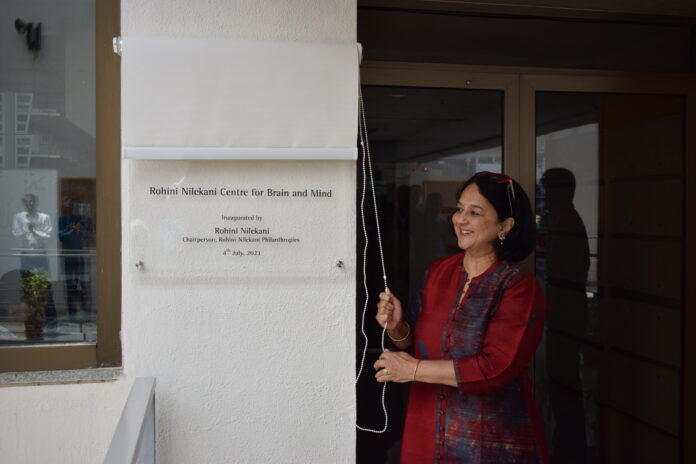Chennai: The National Centre for Biological Sciences (NCBS) has today announced the launch of the ‘Rohini Nilekani Centre for Brain and Mind’, a centre dedicated to advancing Indian research and practice pertaining to neurodevelopmental disorders and mental health. The centre will focus on the long-term examination of environmental and genetic factors involved in brain development which underlie severe mental illnesses.
Rohini Nilekani, Chairperson – Rohini Nilekani Philanthropies, unveiled the plaque to mark the inauguration of ‘the Center for Brain and Mind’ today in the NCBS campus in Bengaluru. The guests present included Prof. K. VijayRaghavan – DAE Homi Bhabha Chair, NCBS-TIFR, Prof. Sanjeev Jain – Emeritus Professor, NIMHANS, Prof. Mahendra Rao – Former Collaborative Science Chair, inStem & CEO, Implant Therapeutics, and Prof. Maneesha Inamdar – Director inStem.
The centre will support research through its partnership with the National Institute of Mental Health and Neurosciences (NIMHANS) and NCBS’ therapeutic practices pertaining to five mental disorders: schizophrenia, bipolar disorder, addiction, obsessive-compulsive disorder, and dementia – conditions considered neurodevelopmental in origin. The research work of the centre will combine the molecular biological research capabilities and technologies at NCBS with the stem cell capabilities established at the Institute for Stem Cell Science and Regenerative Medicine (inStem-DBT), an autonomous institution under the Department of Biotechnology, Govt. of India. inStem has been and will continue to partner with NCBS on research activities, including that of the Accelerator program for Discovery in Brain disorders using Stem cells (ADBS).
Speaking about the centre, Rohini Nilekani, Chairperson of Rohini Nilekani Philanthropies, said, “India has a significant number of people, around 193 million, dealing with mental illness. The proportional contribution of mental disorders to the total disease burden in India had almost doubled since 1990, and this calls for urgent attention. ‘The Centre for Brain and Mind’ will attempt to address this challenge by driving interdisciplinary research to understand the complexities of brain and mind conditions. More Research originating from India is critical at this juncture. The collaboration between NCBS and NIMHANS will provide globally relevant insights, evidence and pathways for better treatment for millions of people in India and the world. I hope medical practitioners, decision-makers and researchers will join the community and co-create success for this endeavour. “
Talking about the centre, Prof L. S. Shashidhara, Director, NCBS, said: “Improvements in human health and well-being have often been possible through the development of new technologies and their application to finding solutions for medical problems. We are at an opportune moment where recent advances in genomics, cell biology and stem cell technology offer an exciting opportunity for discovery science that can be applied to the problems of human mental illness. With the generous support of Rohini Nilekani Philanthropies (RNP), NCBS looks forward to working with NIMHANS and other partners at ‘the Center for Brain and Mind’ to develop new solutions for the early diagnosis and better clinical management of mental illness. “
Commenting on the Centre, Dr Pratima Murthy, Director, NIMHANS, said: “It is a greater challenge to get research support for mental health as compared to physical disorders like cancer. NIMHANS, along with NCBS, has been carrying out research looking at shared and unique markers in severe mental illness. The generous funding provided by the Rohini Nilekani Philanthropies to NIMHANS and NCBS in order to establish ‘the Centre for Brain and Mind’ at both institutions is a great opportunity to further this research. This will enable us to look further into the common as well as distinctive biological (including genetic) and psychosocial underpinnings of disorders such as schizophrenia, bipolar mood disorders, obsessive-compulsive disorders, addictive disorders and dementia. We hope that with the help of the RNP, we will be able to help lakhs of people with severe mental diseases to eventually receive more effective interventions.”

